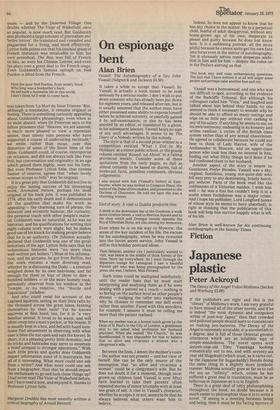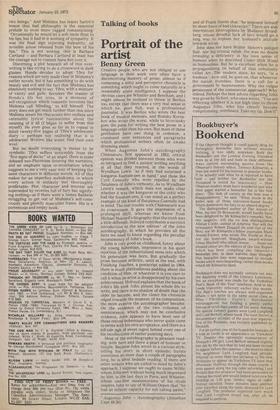Japanese plastic
Peter Ackroyd
The Decay of the Angel Yukio Mishima (Seeker and Warburg £3.00) If the publishers are right and this is the "climax" of Mishima's work, I am very grateful to have missed all of the other novels, and if he is indeed "the most dynamic and outspoken writer of post-war Japan" then that crowded and polluted people should learn to concentrate on making pen-batteries. The Decay of the Angel is extremely scrutable; it is novelettish to a degree, and is full of those Oriental gnomic utterances which are an infallible sign of simple-mindedness. The novel opens with sixteen-year-old TOru Yasunaga looking romantically out to sea, and with seventy-six year old Shigekuni (which must, as it turns out, be the Japanese for Sugardaddy) Honda doing the same thing in a slightly more symbolic manner. Mishima actually goes so far as to call the sea an "infinity" which, unless he has suffered a great deal in translation, must be as ludicrous in Japanese as it is in English.
There is a great deal of tatty philosophising throughout the book, no doubt because it is much easier to philosophise than it is to write a novel: "If seeing is a meeting between being and being, then it must be the facing mirrors of
two beings." And Mishima has learnt Sartre's lesson that bad philosophy is the essential prelude to even more ragged romanticising: "Occasionally he would let a soft smile float to his lips, but it had in it nothing of sympathy. It was the final sign rejecting humanity, an invisible arrow released from the bow of his lips." This is not writing, this is Barbara Cartland — and Barbara Cartland at least has the courage not to commit hara-kiri over it.
Discerning a plot beneath all of this overwriting is like trying to do a crossword in dark glasses. Honda decides to adopt Tom for reasons which are only made clear in Mishima's earlier novels, but it has something to do with beauty and evil and the fact that Mishima has absolutely nothing to say. TOru, with a mixture of vanity and guile, becomes the master of Honda's life but tries, in a moment of self-recognition which romantic novelists like Mishima call 'blinding,' to kill himself. The story does not get much further than this since Mishima steers his characters into endless and ostensibly lyrical ruminations about the meaning of it all (I began to suffer from this myself). He even goes so far as to repeat in detail twenty-five pages pf Toru's adolescent diary — perhaps not realising that it is adolescent. Writers, like water, find their own level.
But no doubt everything is meant to be symbolic. TOru suffers noticeably from the "five signs of decay" of an angel, there is some debased neo-Platonism littering the narrative, and an emphasis upon re-incarnation which suggests to me a very easy way of keeping the same characters in different novels. All of this makes for an imperfect melodrama, in which every action is unlikely but thoroughly predictable. Plot, character and interest are superseded by reveries full of fury but signifying nothing—as if there were a James Baldwin struggling to get out of Mishima's self-consciously and phonily masculine frame. His is a portentous and empty book.



























 Previous page
Previous page